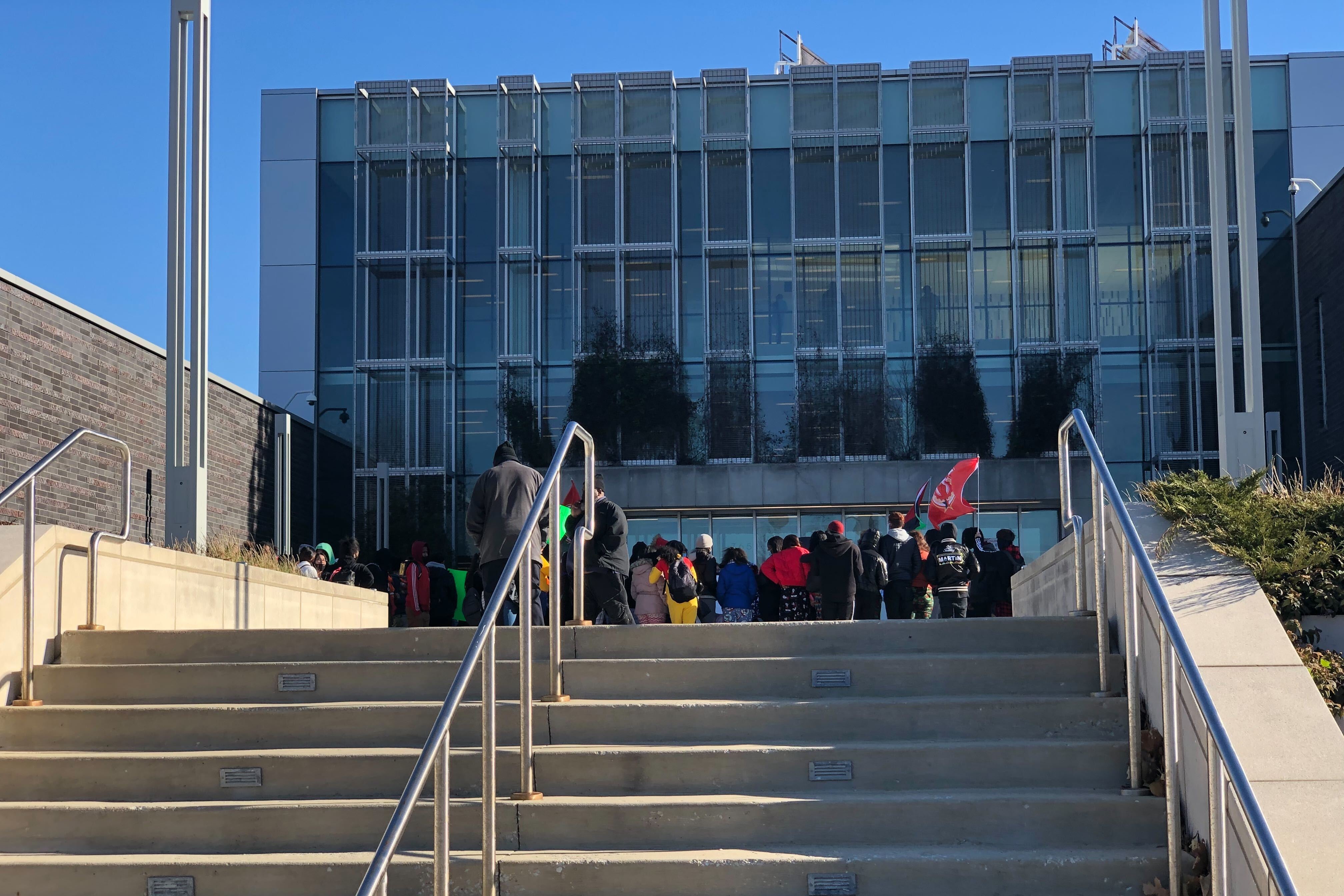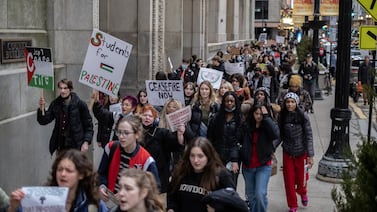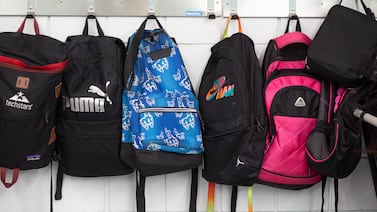A dozen students trickled out the front doors of Sarah E. Goode STEM Academy at 10:45 a.m. Monday. Before long, the group swelled to about 50 students chanting in unison: “We will not be silenced.”
Some Black students at the Ashburn campus say that, for years, they have notified teachers, administrators, and security guards that students are using racial slurs on campus. Those concerns have largely been ignored or dismissed as a joke, they said.
The walkout served as a way to call attention to what students said was a culture of unchecked racism at the school, which is 61% Latino and 37% Black, with 2% of students identifying with other races, said senior Kendall Canteberry, one of the organizers of the walkout.
The student protest came amid increasing national scrutiny over the way conversations on race are handled in classrooms and schools. It also comes six months after the district said it was working to build an anti-bias culture at its campuses but has not fully detailed its plans.
In addition to saying they have endured racial slurs from other students, Black students alleged they have been targeted by some teachers who kicked them out of class or called security on them, Canteberry said. The student said a number of Black teachers have left the school over the past four years.
According to state report card data, Goode has had some turnover over the last few years, which was in line with districtwide numbers.
In 2018, 131 students at Goode received out-of-school suspensions. Black students accounted for 68% of the suspensions, compared with 24% for Latino students, according to a ProPublica analysis of disciplinary data collected by the U.S. Education Department’s Office of Civil Rights.
Goode STEM Principal Armando Rodriguez deferred questions to Chicago Public Schools. Chicago Public Schools didn’t respond to specific questions from Chalkbeat but shared a letter sent Tuesday morning to parents and students at the school. The district did not respond to specific allegations made by students.
In the letter, Chicago Public Schools acknowledged the student-led effort aimed at “creating equitable learning conditions” for students and staff, “especially students of color and students from other marginalized backgrounds.”
“We recognize and appreciate the students and staff at Goode who are working to bring attention to these issues, and we are committed to working with the Goode community to address students’ concerns and work toward a common goal of creating a safe and equitable school community,” the district wrote in the letter.
Monday’s nearly 20-minute walkout comes amid mounting frustrations of inaction from administration to address the persistent complaints, Canteberry said.
“Regardless of how many times we report it, nothing has changed,” the 17-year-old senior said. “They always say the same thing: ‘Changes will be made soon.’”
“We are tired of the racism,” he said, “tired of how we are being treated as students.”
Another student organizer, who asked not to be named for fear of retaliation, said the walkout was aimed at calling out “prejudice and racism” at the school.
In the letter to the Goode parents, Chicago Public Schools said it planned to establish a Student Voice Committee, develop a social-emotional learning plan, and co-design a racial healing plan at the school. The district also plans to host community meetings to help develop goals around cultural responsiveness, anti-racism, and anti-bias at Goode.
Chicago Public Schools has been actively encouraging conversations about race in its classrooms.
Following the Breonna Taylor shooting death by police, Janice Jackson, CPS’s former CEO, sent a citywide letter encouraging school communities to have “honest and productive conversations about racial justice and our role in fighting systemic racism.”
The walkout comes on the heels of a district announcement earlier this year that Chicago intended to build a system to report incidents of racism and bias. The program Transforming Bias-Based Harm aims to focus on non-disciplinary solutions and school-level training for students and staff to recognize implicit bias and microaggressions.
Under the plan, the district would also investigate more serious instances of racism.
The district announced the system after students at some selective enrollment high schools began using social media to document alleged incidents of racism at their schools, which they said included racial slurs, bullying, and racial profiling by school security officers.
District officials previously said students and families are able to start reporting incidents of perceived bias on the CPS website or by emailing civilrights@cps.edu.
Tina Curry, a teacher and former equity coach at Sarah E. Goode, said issues at the school stem from “bias that goes unchecked.”
“It doesn’t start as racism,” Curry said. “When bias goes unchecked, it can turn into discrimination and racism. That’s been the problem here.”
Curry used to teach an activism unit in her class during which Black students shared experiences of being barred from using the restroom or being locked out of class after the bell, as well as experiencing racism at the school.
Black students have said they see their peers being treated differently, Curry said, describing instances where Black students would be singled out and disciplined differently.
Curry said these disciplinary practices targeting Black students were going “unchecked” at the school and “our children are the ones who are suffering, especially our Black children, especially our Black girls.”
“They are punished more harshly for the same offense than their Latino peers,” Curry said. “And Black students see this.”
Students started petitions and surveys and raised concerns with administration but nothing has changed, Curry said.
In response, administrators canceled the activism program for the semester and later reinstated it after student pushback, Curry said.
Curry said the initial move to remove the activism program was part of a larger culture problem and microaggressions at the school that are forcing Black teachers to leave.
During school dismissal on Monday, a senior student, who asked not to be named for fear of retaliation, said she heard stories of peers experiencing racism from other students. She didn’t participate in the morning walkout because administrators told students there would be consequences.
Black and Latino students and Black teachers have been dealing with racism at the school for years, but students didn’t know how to move forward with their frustrations, Canteberry said.
Had the pandemic not happened, Canteberry feels as though the issue would have come to a head much earlier.
Canteberry and other organizers plan on continuing to host meetings to make sure the racism they’ve experienced gets addressed not just for current students but for students who will attend the school in the future.
“We hope that this protest and this walkout finally changes things — changes the racism — and have our voices be heard,” Canteberry said. “I really hope we can really sit down and change things for students and staff to be happy.”








